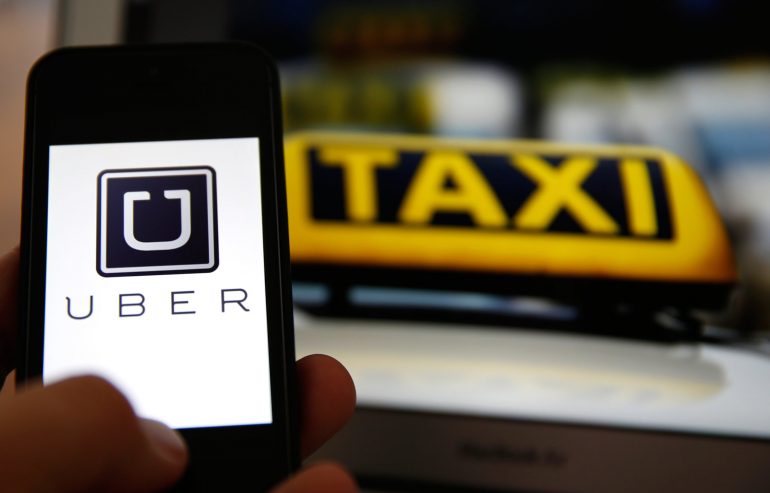The city of Toronto has begun to lay out its case that Uber is violating municipal by-laws today, as it pursued a permanent injunction to prevent the company from continuing to provide its popular ride-sharing service, UberX.
The first day of a 3-day hearing comes on the heels of an Uber rally held at Nathan Phillips Square in May. Toronto taxi drivers, who have taken issue with Uber’s growth and subsequent popularity in Toronto, organized a protest of their own and took to the streets today, honking their horns and snarling traffic as they drove from Yonge and Queen’s Quay to City Hall.
“The city of Toronto has the means to regulate the entire industry… It shouldn’t fall in my lap to regulate it.”
– Justice Sean Dunphy
Michele Wright, solicitor for the city of Toronto, got off to a rough start with Ontario Superior Court Justice Sean Dunphy and struggled with presenting arguments that supported the long-held position that Uber is a brokerage and thus needs to have a license to operate (note: The city of Toronto confirmed to BetaKit that Uber has applied for a taxi licence, but has not yet been granted one. No application for a limousine licence was made at the time of publishing).
Dunphy argued repeatedly that the city has had plenty of opportunities to write regulations around ride-sharing, but failed to do so. “The city of Toronto has the means to regulate the entire industry… It shouldn’t fall in my lap to regulate it,” he said. He also questioned why it hadn’t done so during the recent Taxicab Industry Review, and wondered aloud if there was the political will to do rewrite the by-laws or whether it was even his responsibility to “fill in the gaps in legislation.”
https://twitter.com/jkozuch/status/605414632497528832
Spokespeople for the cab industry have stated they don’t have a problem with Uber, as long as they’re licensed and work within the guidelines set forth in the municipal bylaws. “We have no problem with the technology or the innovation they [Uber] have; we actually encourage it and we want more innovation and more technology that makes it easier for customers to get into licensed taxis,” said Sam Moini of the Toronto Taxi Alliance, who attended today’s hearing. “We will support it 100%.”
John Tory also continues to be a vocal supporter of Uber, and at a recent meeting of Toronto’s Executive Committee, buried Councillor Jim Karygiannis’ motion to remove Uber from city-issued smartphones in light of the legal battle between the Silicon Valley company and the city of Toronto. Tory’s support of Uber has caused discord between his administration and the city of Toronto’s Municipal Licensing & Standards division, having emphatically said that he “will not have this city stuck in the 1970s” because of the current municipal by-laws.
In the afternoon session, while Twitter users posted hundreds of messages of support for Uber, counsel for the city of Toronto continued to set up their case against Uber by saying that while someone can’t use freedom of expression to run an illegal business, an injunction preventing Uber from operating wouldn’t infringe on their charter rights of freedom of expression.
https://twitter.com/jkozuch/status/605473163888033792
Once the city of Toronto had finished presenting their arguments, Uber’s counsel, led by Goodmans partner Julie Rosenthal, argued the city of Toronto should be responsible for updating the municipal bylaws governing transportation, adding “the city has rightly or wrongly adopted a regulatory scheme that is triggered by calls or requests. Uber is simply putting passengers in touch with drivers, and do not trigger the regulatory scheme and are not subject to regulations.”
“We introduced the first taxi app in 2012, long before Uber came to the city,” responded Kristine Hubbard, Operations Manager at Beck Taxi. “A lot of the technology is behind the scenes. We haven’t shared the technology with the public. Just because the public doesn’t see it, doesn’t mean those changes aren’t happening. We love technology, but we don’t necessarily think a smartphone app is the only way to go. We need to be cognizant of everyone’s needs. We need to think about seniors and accessible service, too. We want to make sure there is fair and equitable access to taxi service.”
On the topic of the revising the municipal guidelines around transportation in Toronto, Hubbard had this to share: “As soon as the city started talking about a taxicab industry review, I was excited at the opportunity to talk about technology. I referred to Uber and said that they fall out of the regulations. I was told by regulators that I was preventing cab drivers from making money. I felt sabotaged. If you look at Chicago, Uber has used the taxi system to build their UberX customer base. Why wouldn’t they do that here? Why would they work with a licensed regime if they don’t have to?”
The hearing will continue again tomorrow with arguments from Uber’s counsel.
Disclosure: Justin Kozuch is a former employee of Hailo, a competitor of Uber.


